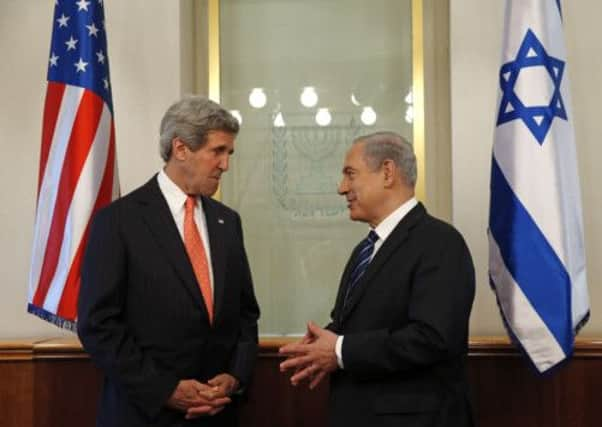Analysis: Netanyahu unlikely to give Kerry peace


Despite a show of determination by Mr Kerry on his fourth visit to Israel, neither the characterisation nor the optimism have much basis in reality. Put simply, Israel is not on board his peace effort and the nationalist proclivities of Mr Netanyahu and his coalition partners make this unlikely to change.
In recent days it has become clear that not only is Mr Netanyahu’s opposition to a viable Palestinian state continuing, but also that his key partner, Yair Lapid, the finance minister, is staking out a hard-line stance. In the most telling indicator yet of the new government’s intentions in the occupied West Bank, Israel decided last week to legalise four settlement outposts rather than dismantle them, a move that amounts to the creation of new settlements in areas Palestinians envision as the heartland of a future Palestine.
Advertisement
Hide AdAdvertisement
Hide AdAfter the January elections, it had been hoped by liberal Israelis that Mr Lapid’s secularist Yesh Atid (There is a Future) party would be a moderating influence. It turns out there is not much difference between Mr Lapid and the far-right pro-settler Jewish Home party that is also a coalition partner.
In his first interview addressing the Palestinian issue, Mr Lapid said on Sunday that he will not stop the “natural expansion” of West Bank settlements, ruled out a future Palestinian capital in East Jerusalem and voiced scepticism over whether a deal could be struck with Palestinian president Mahmoud Abbas, whom he termed “one of the founding fathers of the victimising concept of the Palestinians”.
Like Mr Netanyahu, Mr Lapid says he wants the resumption of negotiations, but it is unclear what, if anything, these talks could be about.
Indeed, without substantial pressure on Israel, the current Israeli government will not meet the Palestinian demands that Israel halt its settlement expansion on the territory of the future state and accept the 1967 border between Israel and the West Bank as the basis for negotiations. Thus, prospects for getting the two sides back to talks appear bleak. But even if they do meet for negotiations so as not to be blamed by the US for obstructing them, the chances for the peace deal Mr Kerry is striving for are “nil” in the view of Yossi Alpher, former director of the Jaffee Centre for Strategic Studies.
“Netanyahu understands it’s important to be seen as negotiating, but when push comes to shove he is not prepared to give up on territory,” says Mr Alpher.
Mr Abbas cannot afford to get into negotiations that lead nowhere. This would increase his exposure to criticism from the militant Islamic movement Hamas and also from within his own Fatah movement. Qais Abdul-Karim, a veteran Palestinian MP who supports Mr Abbas, says the Palestinian leader simply will not enter negotiations unless Israel recognises the 1967 borders. “I don’t believe Abbas is in a position to get into this venture again after years of stalemate on this particular point. It would be meaningless and pointless.”
l Ben Lynfield writes for The Scotsman from Jerusalem.